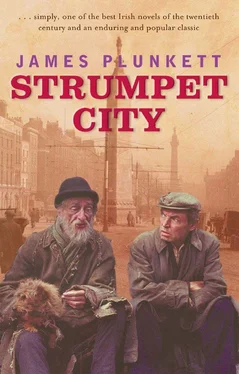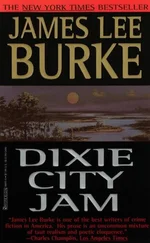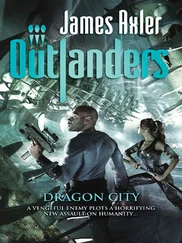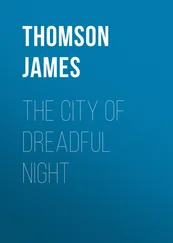‘Dammit, Belton, you have wonderful warmth and tone tonight. You surpassed yourself.’
Mr. Yearling was refreshing himself with a glass of whiskey.
Although the evening was warm she had had a fire lit, not only as a courtesy to the company but because a room without a fire made her restless. She loved to see its light flickering on the walls and shining on the glasses and glowing deeply in the rich varnish of Mr. Yearling’s ’cello. Through the french windows she watched the last light lingering on the lawn, giving the grass a reddish tint and picking out the contrasting colours of the flowers. The laburnum at the end, in full flower, glowed deeply yellow, its base encircled by fallen blossoms. She had remarked that it had been a beautiful day for the royal pair and that had drawn the information from Mr. Yearling about the manner of their return.
‘Let’s hope they don’t go to Belfast,’ Mr. Yearling added, when he had finished his whiskey.
‘Why not, Belton?’ Mr. Bradshaw asked.
‘This fellow Larkin has the city in a state of revolution.’
‘Of course,’ Mr. Bradshaw admitted. He had questioned without thinking very deeply about what he was saying.
‘The military are camped in the main streets,’ Father O’Connor contributed.
‘They mean business too. They fired on the strikers the other day.’
‘There have been deaths,’ Father O’Connor reminded them. ‘It is so very regrettable.’
‘Hope he keeps away from Dublin,’ Mr. Bradshaw said.
‘He will, because he’ll be broken,’ Mr. Yearling assured him. ‘If our chaps don’t do it his own people will. Sexton has threatened to expel him.’
‘Who’s Sexton?’ Father O’Connor asked.
‘The general secretary of the union Larkin represents. Apparently Larkin called this strike without the sanction of the union executive. From his speeches he seems to be a law unto himself.’
‘It’s a pity it should be necessary,’ Father O’Connor said.
The company looked at him curiously. Father O’Connor flushed. He was quite young.
‘Don’t misunderstand me—I am totally against Mr. Larkin’s outrageous methods. He seems to me to be little better than a socialist. But I understand conditions are very, very bad in Belfast.’
Mr. Yearling surprised everybody by saying:
‘They are very bad in Dublin too.’
‘Nonsense,’ Mr. Bradshaw said, rudely.
‘Ralph,’ Mrs. Bradshaw reproved him.
‘Sorry. But you surprise me, Belton.’
‘Facts,’ Mr. Yearling insisted, sticking to his guns.
‘I think we should have a little music,’ Mrs. Bradshaw suggested. She smiled at Father O’Connor. ‘You haven’t done anything for us, Father.’
‘Of course,’ the others agreed.
Father O’Connor opened his music case and selected a piece which he handed to Mrs. Bradshaw. She went to the piano.
‘What is it, Father?’
‘“Ave Maria”,’ Mrs. Bradshaw answered, smoothing the sheets.
‘Schubert or Gounod?’
‘Actually,’ Father O’Connor said, a little apologetically, ‘it’s by Locatelli.’
Behind Father O’Connor’s back Mr. Yearling’s bushy eyebrows arched enquiringly at Mr. Bradshaw. Mr. Bradshaw shrugged his ignorance of the piece and Mr. Yearling acknowledged with a nod. Neither was enthusiastic. They felt the priest’s selection was in dubious taste. A social evening should be kept strictly secular. Besides, Mr. Yearling was a Protestant.
Father O’Connor sang pleasantly, if a little bit too sweetly. His voice had a touch of vibrato, poorly controlled. Still, he knew something about music generally: he could sight read quite well too.
‘Bravo,’ Mr. Bradshaw said when he had finished.
‘I’m not of your persuasion, Father, but I think the “Ave Maria” is a very beautiful prayer,’ Mr. Yearling contributed.
Everybody thought it uncommonly handsome of him, a further proof of his offhanded generosity and tolerance. Mr. Bradshaw pressed him to another liberal measure of whiskey. Father O’Connor declined a glass of port; Mr. Bradshaw helped himself instead.
“You’ve had the training, Father,’ he said.
‘In the seminary we were allowed to study music.’
‘One can hear it in the voice. It’s unmistakable.’
‘The training, yes,’ Father O’Connor said, ‘but not the equipment.’ He laughed. He was a genuinely modest man.
‘I know now what keeps you in Kingstown,’ Mrs. Bradshaw said, smiling affectionately at him. ‘You love training our church choir.’
‘Have you chaps a choice?’ Mr. Yearling asked. ‘I mean, about where you are going to be stationed?’
‘Oh no,’ Mr. Bradshaw explained, ‘a priest must go where he’s sent. It’s part of the rule of obedience.’
‘We can apply for special work,’ Father O’Connor added.
The friendly interest of the company focussed on him and he responded to it before he quite realised it.
‘As a matter of fact, I may be leaving Kingstown shortly.’
‘Oh no,’ Mrs. Bradshaw said.
‘I’ve asked to be transferred to a poor parish. I’d like to work among the poor.’
He discovered too late that he had embarrassed the company. He became embarrassed himself. He plunged on.
‘My mother had a great devotion to St. Vincent de Paul, you see, and she encouraged it in me too.’
‘Is that why you were christened . . . ?’
Mr. Yearling, not certain of the propriety of mentioning a priest’s Christian name, left his sentence unfinished.
‘Yes. I was called Vincent,’ Father O’Connor said.
‘We would be very sorry to lose you,’ Mrs. Bradshaw said.
‘Perhaps you won’t,’ Father O’Connor said, ‘perhaps I have not the ability.’
It was obvious that he was not anxious to say any more. He looked across at Mr. Bradshaw.
‘Isn’t it time our host obliged?’ he suggested generally.
Mr. Bradshaw rose and looked for suggestions to his wife. She said:
‘The policeman’s song from The Pirates. ’
Mr. Yearling laughed and said:
‘Well, that’s topical enough anyway. I see Mr. Larkin has the police going on strike in Belfast too.’
Everybody enjoyed the joke except Mrs. Bradshaw, who did not follow the reference. Mr. Yearling explained to her that Larkin had spoken to the policemen who were keeping his strikers in order and had told them that they were not being paid enough for their heavy duties. He had roused them to such a pitch of resentment that the police were threatening to go on strike too.
‘That’s why the Chief Secretary asked for the help of the military,’ Mr. Bradshaw put in.
Mrs. Bradshaw said Larkin must be a remarkable strike leader. It all sounded fantastic.
‘Gilbertian,’ Mr. Yearling roared, in sudden inspiration. Everybody laughed aloud and as a result of his aptness Mr. Bradshaw’s rendering of ‘A Policeman’s Lot’ was punctuated all the time by smiles and laughter.
‘We really must be serious,’ Mrs. Bradshaw said when it was over.
‘Very well,’ said Father O’Connor, ‘why not something from The Yeomen of the Guard ?’
‘Yes,’ Mr. Yearling said, ‘why shouldn’t we too introduce the military.’
But Father O’Connor, having acknowledged the quip, went on to deal seriously with the opera he had mentioned. He said he had always felt that The Yeomen of the Guard contained Sullivan’s best music. The rest agreed. Mr. Yearling praised Sullivan’s setting for ‘Onward Christian Soldiers’. Mr. Bradshaw drew attention to the musical excellence of ‘The Lost Chord’.
‘How long is it since he died?’ Mr. Yearling tried to remember.
‘Seven years,’ Mrs. Bradshaw said.
‘It doesn’t seem that long, really.’
Читать дальше












